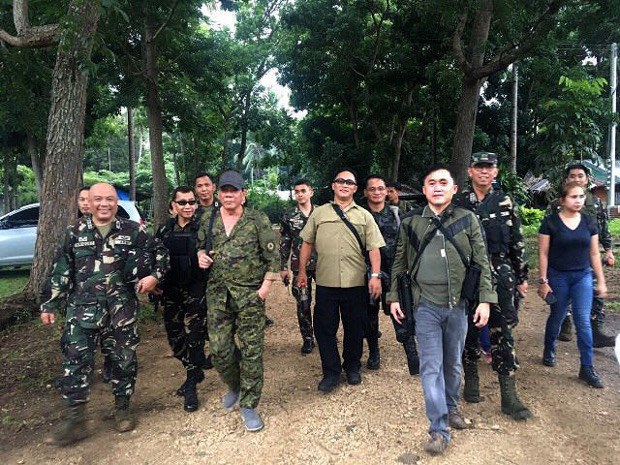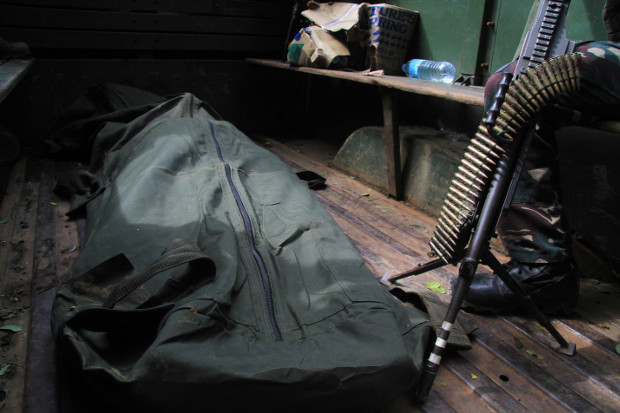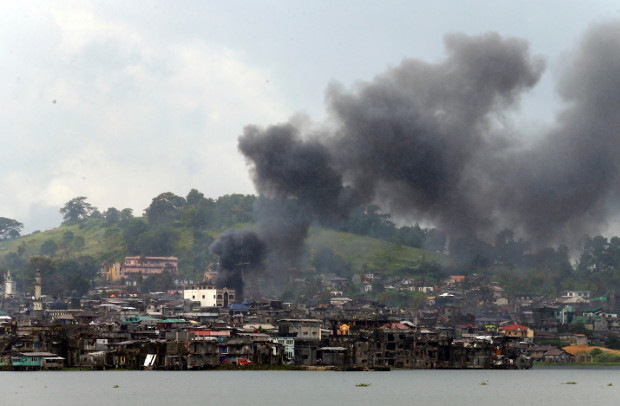A Year Into Office, Philippine Leader Enjoys High Approval Rating: Poll
2017.07.07
Manila
 Philippine President Rodrigo Duterte (wearing gray baseball cap) visits government troops in the village of Maria Christina in Iligan City, about 29 km (18 miles) north of Marawi city, July 7, 2017.
Philippine President Rodrigo Duterte (wearing gray baseball cap) visits government troops in the village of Maria Christina in Iligan City, about 29 km (18 miles) north of Marawi city, July 7, 2017.
Philippine President Rodrigo Duterte’s approval rating has soared a year into his six-year term, despite a controversial war on drugs and a siege by Islamic State-linked fighters in the southern city of Marawi, according to an independent poll published Friday.
The survey by respected pollster Social Weather Stations indicated that the net satisfaction rating for Duterte had reached 78 percent, three points higher than the last survey conducted in March.
Only 12 percent of respondents said they were dissatisfied and 10 percent were undecided, according to the poll, which had a margin of error of plus or minus three percent. The survey was carried out on June 23-26 via face-to-face interviews with some 1,200 adults nationwide.
Presidential spokesman Ernesto Abella said the survey was a “clear indication of the growing confidence” in Duterte, who won the presidency last year by an overwhelming vote on a promise to bring change in the graft-ridden bureaucracy and to control the spread of illegal drugs.
Deadly war on drugs
His drug campaign, however, has left 3,171 addicts and small-time dealers dead. More than 10,000 other deaths are still subject for investigation, including those found with cardboard signs that purported they had been summarily executed by pro-government vigilantes.
Rights groups have also given the Duterte administration a failing grade in its first year in power, after Manila earlier rejected a proposed visit by a U.N. special rapporteur on extrajudicial killings.
A former policeman who worked with Duterte’s anti-crime unit when he was a longtime mayor in the southern city of Davao and a self-confessed member of his alleged “death squad” have also filed a complaint against him at the International Criminal Court in The Hague, Netherlands.
The survey came a month after Duterte declared martial law for the whole of the southern island of Mindanao to quell a rebellion by Islamic State-linked Abu Sayyaf and Maute militants, who laid siege to Marawi city with the help of fighters from the Middle East and Southeast Asia.
The military has so far failed to dislodge the militants more than six weeks after the fighting began on May 23.
Referring to the declaration of martial law in the south, Abella said the new survey reflected the Philippine public’s tacit support for “the president’s action following the rebellion in Marawi.”
“This positive acknowledgement of the Filipino people further motivates the administration to work for the restoration of normalcy in Marawi and to start its rehabilitation, as well as bring a comfortable life for all Filipinos, including Muslim Filipinos,” Abella said.

A bag holds the body of a Philippine soldier who was killed in fighting in the southern city of Marawi, July 3, 2017. Richel V. Umel/BenarNews]
Situation in Marawi
On Friday, the military said it was slowly advancing in Marawi but that it had yet to clear about 1,000 buildings and establishments in the city’s central business district, where an estimated 80 fighters were still holding out. About 300 civilians are also believed trapped in the intense clashes or are held as hostages by the group, officials said.
The death toll from the battles in Marawi has also risen steadily. Since the start of the clashes, 87 soldiers have died, including two who were slain in firefights Thursday, according to government officials. More than 350 militants and 39 civilians have also been killed.
Intelligence operatives have reported that Abu Sayyaf leader Isnilon Hapilon, the acknowledged leader of the Islamic State in the Philippines, and his men appear to be fighting on in Marawi, military spokesman Brig. Gen. Restituto Padilla said Friday.
He said the military had obtained leads on areas where Hapilon is believed to be hiding, but he could not publicly disclose this information.
“As to the death of some of the Maute brothers, there is indication that one has died but until such time that the grave on where he was buried is located, we cannot categorically confirm. But for the others, we believe they are alive,” Padilla said. This was an apparent reference to unconfirmed reports that Omarkhayam Maute, one of the militant leaders, had been killed.
Padilla said ground forces estimate that there were about 80 fighters still left in Marawi, whose firepower appears to have weakened.
Asked when the military could finally end the war, Padilla said: “It would not be that long anymore because in one area, they (the militants) have not been firing back as much.”
But, Padilla said, there were other areas in Marawi where the fighting has been intense, indicating that the militants’ “stockpile of weapons could still be there and they may have enough.”
Jeoffrey Maitem in Marawi, Philippines, contributed to this story.

Smoke billows from a section of Marawi bombed by Philippine government forces, July 5, 2017. [Jeoffrey Maitem/BenarNews]







